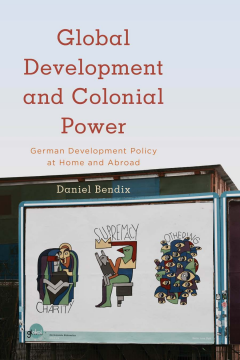
Additional Information
Book Details
Abstract
Although Germany was one of the principal colonising nations in Africa and today is the world’s second largest aid donor , there is no literature on the postcolonial condition of contemporary German development policy.
This book explores German development endeavours by state institutions as well as NGOs, and provides evidence of development policy’s unacknowledged entanglement in colonial modes of thought and practice. It zooms in on concrete policies and practices in selected fields of intervention: development education and billboard advertising in Germany, and – taking Tanzania as a case in point – obstetric care and population control in the Global South. The analysis finds that disregarding colonial continuities means to perpetuate the inequalities and injustices that development policy claims to fight. This book argues that colonial power in global development needs to be understood as functioning through the transnational character of development policy at home and abroad.
An original and comprehensive account of German development policy and one of a few studies to focus on development interventions concerning population control and reproductive health. Drawing on a range of archival materials, interviews with German development workers and observation, Daniel Bendix provides a convincing account of the discursive and non-discursive continuities from the colonial period into contemporary development interventions.
Cheryl McEwan, Professor of Human Geography, Durham University
Daniel Bendix's rigorous, daring and original analysis challenges dominant understandings of history and development by engaging with the violences, paradoxes and present effects of Germany's colonial power. Bendix invites readers to open horizons for postcolonial futures by facing their complicity in systemic harm and the complexities of our planetary interdependence. This book offers a major contribution to international debates about the historical and systemic (re)production of global inequalities.
Vanessa Andreotti, Professor and Canada Research Chair in Race, Inequalities and Global Change at the University of British Columbia
In this accessible and meticulously-researched book, Daniel Bendix offers a nuanced and compelling account of Germany’s development interventions, challenging the Anglocentric focus of much postcolonial and critical race thinking on development with a reminder of the multiplicity of colonial projects and contemporary development interventions. What is equally refreshing is that Bendix consistently analyses the links between the discursive and the material, tracing across different historical periods the connections between shifting discourses around fertility and population growth and the changing interests of transnational German capital.
Kalpana Wilson, Lecturer in Geography, Birkbeck, University of London
Based on painstaking research on a previously neglected development context, this book is an impressive and much needed contribution to post-colonial development studies. By challenging monolithic narratives of colonization, the book serves as a crucial reminder that we need to recognize the various and multifaceted ways in which colonial power is manifested in contemporary international development.
Maria Eriksson Baaz, Professor in Peace and Development Research, University of Gothenburg, Sweden
Daniel Bendix is a Professor for Global Development at Friedensau Adventist University, Germany.
Table of Contents
| Section Title | Page | Action | Price |
|---|---|---|---|
| Global Development and Colonial Power | Cover | ||
| Contents | v | ||
| List of Figures | vii | ||
| Acronyms | ix | ||
| Acknowledgements | xi | ||
| 1 Introduction | 1 | ||
| 2 German Colonialism, Development Policy and Colonial Power | 15 | ||
| 3 Development Education and the (De-)Stabilisation of Colonial Power | 39 | ||
| 4 Billboard Advertising and the Potential for Subverting Colonial Power | 65 | ||
| 5 Transforming Childbirth-Related Care in East Africa and Challenges to Colonial Power | 91 | ||
| 6 Controlling Population in East Africa | 121 | ||
| Conclusion: Colonial Power Transnationally, the German Case and Postcolonial Future | 143 | ||
| Appendix: List of Cited Interviews | 153 | ||
| Bibliography | 155 | ||
| Index | 189 | ||
| About the Author | 195 |
